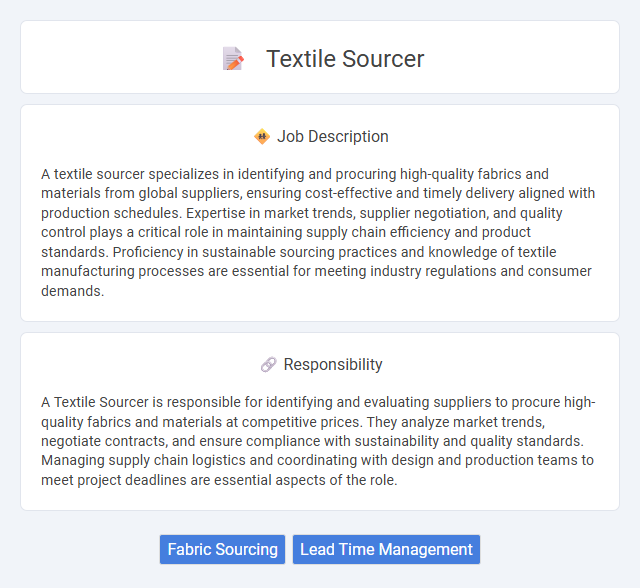
A textile sourcer specializes in identifying and procuring high-quality fabrics and materials from global suppliers, ensuring cost-effective and timely delivery aligned with production schedules. Expertise in market trends, supplier negotiation, and quality control plays a critical role in maintaining supply chain efficiency and product standards. Proficiency in sustainable sourcing practices and knowledge of textile manufacturing processes are essential for meeting industry regulations and consumer demands.
People with strong attention to detail and good communication skills will likely be well-suited for a textile sourcer job. Candidates who thrive in dynamic environments and can manage multiple tasks simultaneously probably have a higher chance of success. Those uncomfortable with negotiation or fast-paced decision-making might find the role challenging.
Qualification
A Textile Sourcer must possess strong knowledge of fabric types, textile manufacturing processes, and quality control standards to effectively identify and procure suitable materials. Proficiency in supplier negotiation, market trend analysis, and supply chain logistics is essential for optimizing sourcing strategies and ensuring cost-efficiency. Advanced skills in communication and data management tools contribute to maintaining supplier relationships and tracking procurement performance.
Responsibility
A Textile Sourcer is responsible for identifying and evaluating suppliers to procure high-quality fabrics and materials at competitive prices. They analyze market trends, negotiate contracts, and ensure compliance with sustainability and quality standards. Managing supply chain logistics and coordinating with design and production teams to meet project deadlines are essential aspects of the role.
Benefit
The role of a textile sourcer likely offers significant benefits such as access to a global network of suppliers, which can enhance negotiation power and cost efficiency. There is probably a strong potential for career growth due to the industry's continuous demand for innovative materials and sustainable sourcing practices. Working in this position may also provide valuable experience in market analysis and trend forecasting, which are essential skills in the competitive textile sector.
Challenge
Textile sourcer roles likely present the challenge of balancing cost efficiency with quality assurance in a highly competitive market. Navigating the complexities of global supply chains and fluctuating material availability may require strong negotiation and problem-solving skills. There is a probable need to stay updated on sustainable sourcing trends to address increasing environmental concerns in the industry.
Career Advancement
Textile sourcing professionals develop expertise in supplier evaluation, cost negotiation, and quality control to enhance supply chain efficiency. Mastery of sustainable sourcing practices and familiarity with global textile markets increase opportunities for advancement to strategic roles such as Procurement Manager or Supply Chain Director. Continuous skill development in data analytics and trend forecasting further positions textile sourcers for leadership and specialized consultancy positions within the industry.
Key Terms
Fabric Sourcing
Textile sourcers specializing in fabric sourcing strategically identify and procure high-quality textiles to meet production demands and design requirements. They analyze market trends, evaluate supplier capabilities, and negotiate contracts to ensure cost-effective and sustainable material acquisition. Expertise in fiber types, fabric applications, and supply chain logistics is essential for optimizing inventory and maintaining production timelines.
Lead Time Management
Textile sourcers specialize in optimizing lead time management by coordinating suppliers, monitoring production schedules, and ensuring timely delivery of raw materials and finished goods. Effective lead time control reduces inventory costs, mitigates supply chain disruptions, and enhances overall operational efficiency within the textile industry. Expertise in forecasting demand and establishing strong supplier relationships is crucial for maintaining consistent supply and meeting tight deadlines.
 kuljobs.com
kuljobs.com